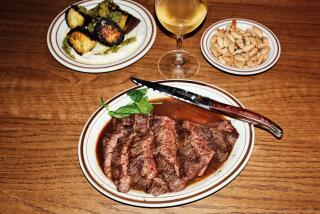Thunderbolt almost closed during COVID. Then it was named one of the world’s best bars
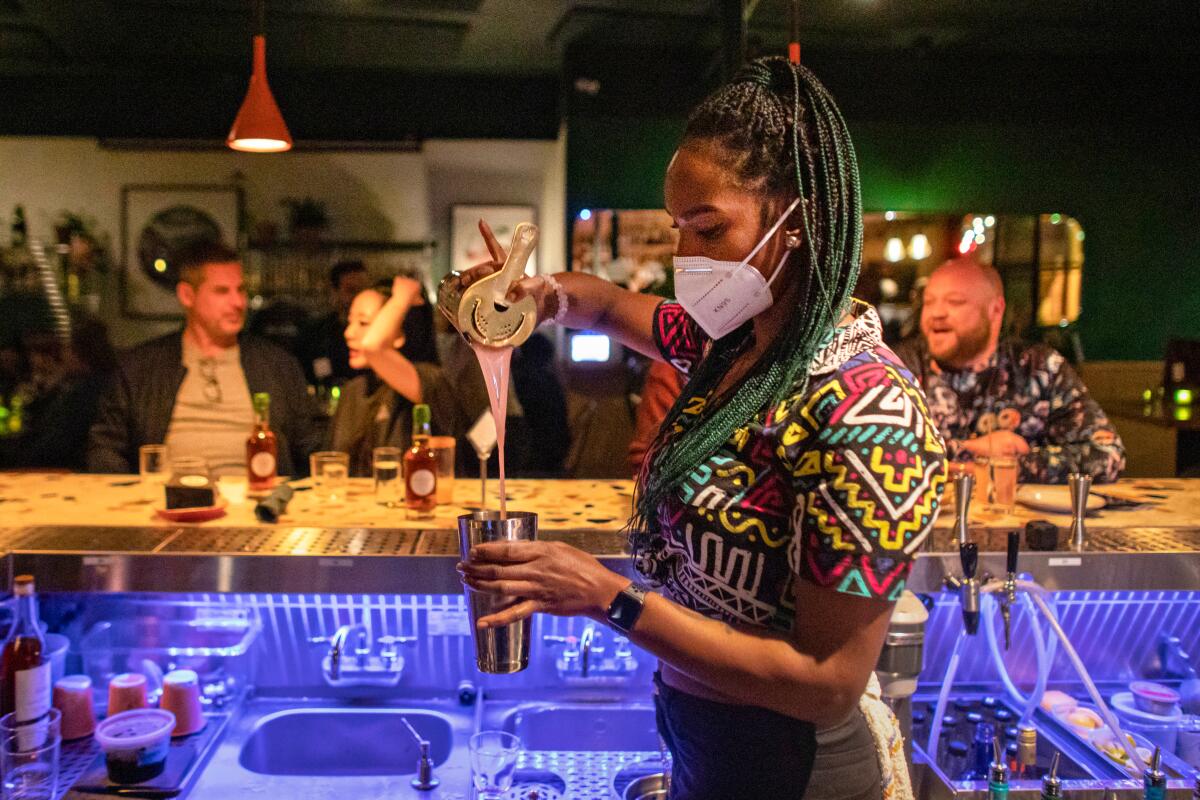
- Share via
There tends to be a certain type of establishment that appears on the prestigious World’s 50 Best Bars list, an annual ranking chosen by the anonymous votes of some 600 industry professionals across the globe.
Among the 2021 honorees: a swanky hotel bar in Central London, a chic speakeasy in Tokyo, a buzzy mixology den in Dubai — establishments that pair well with a platinum credit card and a seat in first class.
Yet there was one name that stood out on this year’s expanded list: Thunderbolt.
The unassuming Echo Park cocktail bar, which opened in late 2019, didn’t crack the top 50 but was named No. 66 on the expanded list of 51-100 and given the “One to Watch” award.
Thunderbolt was the top-ranked bar in Los Angeles this year (the Arts District branch of NYC bar Death & Co landed at No. 99) and only the third L.A. bar to make the list, following the now-closed Walker Inn in 2016 (No. 37) and the Varnish in 2012 (No. 14).
Not bad for a neighborhood spot attached to a sagging Knights Inn and wedged up against the 101 Freeway.
But what makes the story of Thunderbolt so unexpected, however, is not just its sudden elevation onto the international cocktail stage. It’s that it managed to survive long enough to be honored at all.
“We opened six months before the pandemic hit. We weren’t profitable yet. Everything shut down,” said Mike Capoferri, 35, Thunderbolt’s co-owner and lead bartender. “Every day I would ask myself, ‘Is it crazy to keep doing this? Do I close the doors?’”
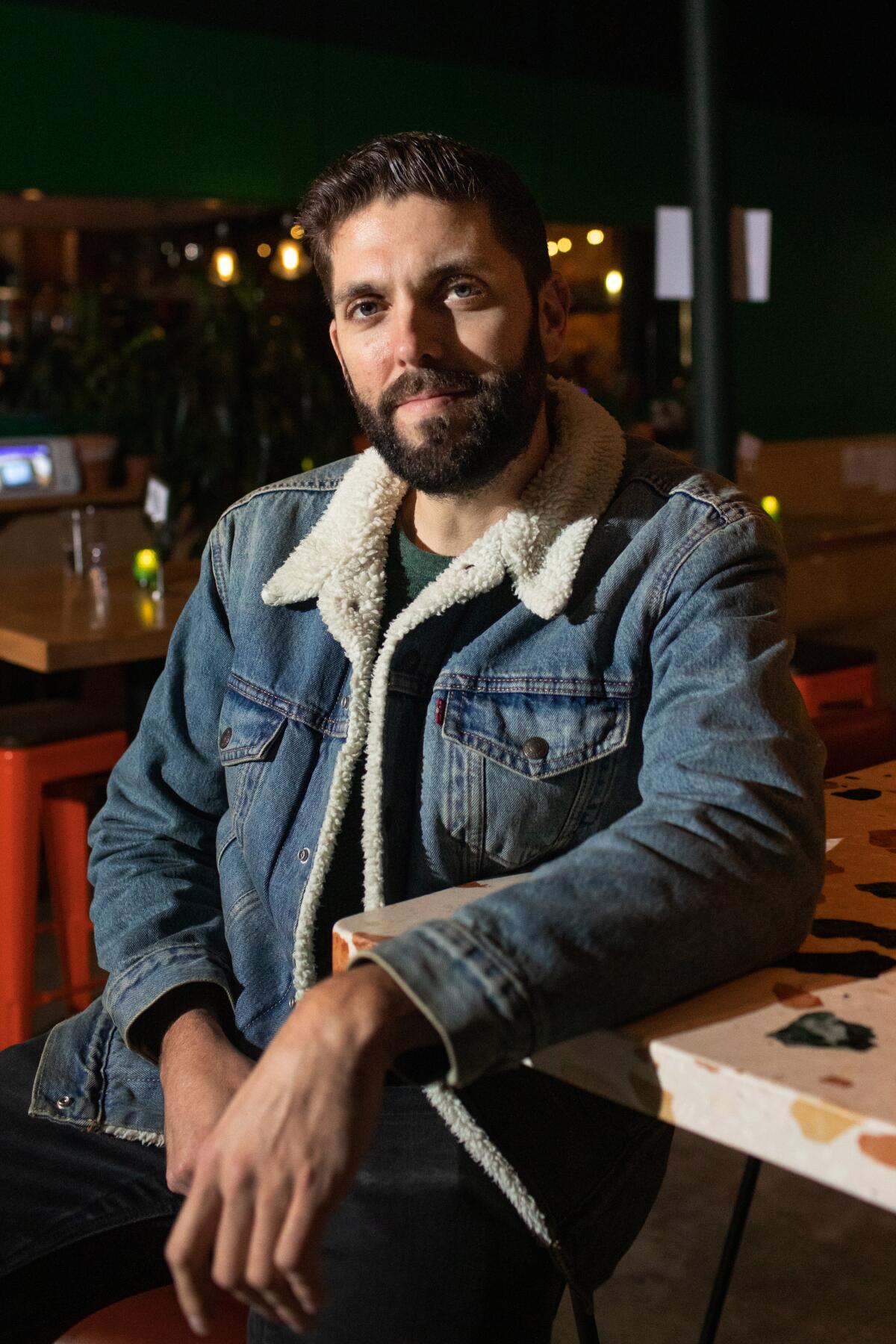
It was a highly personal decision for Capoferri, whose name, fittingly, means “iron-headed” in Italian. He had spent the last 4 ½ years building the neighborhood bar of his dreams, a project that was the culmination of a peripatetic career in the bar industry, and believed that if he closed Thunderbolt, even temporarily, it was likely the bar would be closed for good.
“It’s harder to open the doors a second time than the first,” he said. “And it was really hard the first time.”
Capoferri grew up in the suburbs outside Atlanta — at 14, his first job was manning the blender at a Planet Smoothie, a gig he calls his “introduction to mixology.” He moved to L.A. in his 20s to work for an automotive copywriting firm but quickly decided bartending was a better way to pay the bills, landing a job at West Hollywood’s Soho House under influential L.A. barman Chris Ojeda before moving to 432 Fairfax, Napster founder Sean Parker’s private bar and club in the Fairfax District.
It was a chance encounter with restaurateur Rahul Marwah in 2013, however, that sent Capoferri’s career in a new direction. Marwah is the second-generation CEO of Denco Family, a Whittier-based company that operates franchises of Denny’s, Subway, Popeyes and various hotel chains across Southern California. Denco Family’s latest endeavor was unique: It was opening the first Denny’s in New York City, complete with a full liquor license. Marwah figured Capoferri could design a cocktail menu to generate buzz.
As if fancy cocktails at a Denny’s weren’t unexpected enough, Capoferri came up with a promotional stunt that ended up going viral: a $300 menu item called the Grand Cru Slam, which included two Grand Slam breakfasts and a chilled bottle of Dom Pérignon Champagne. The diner had lines around the block.
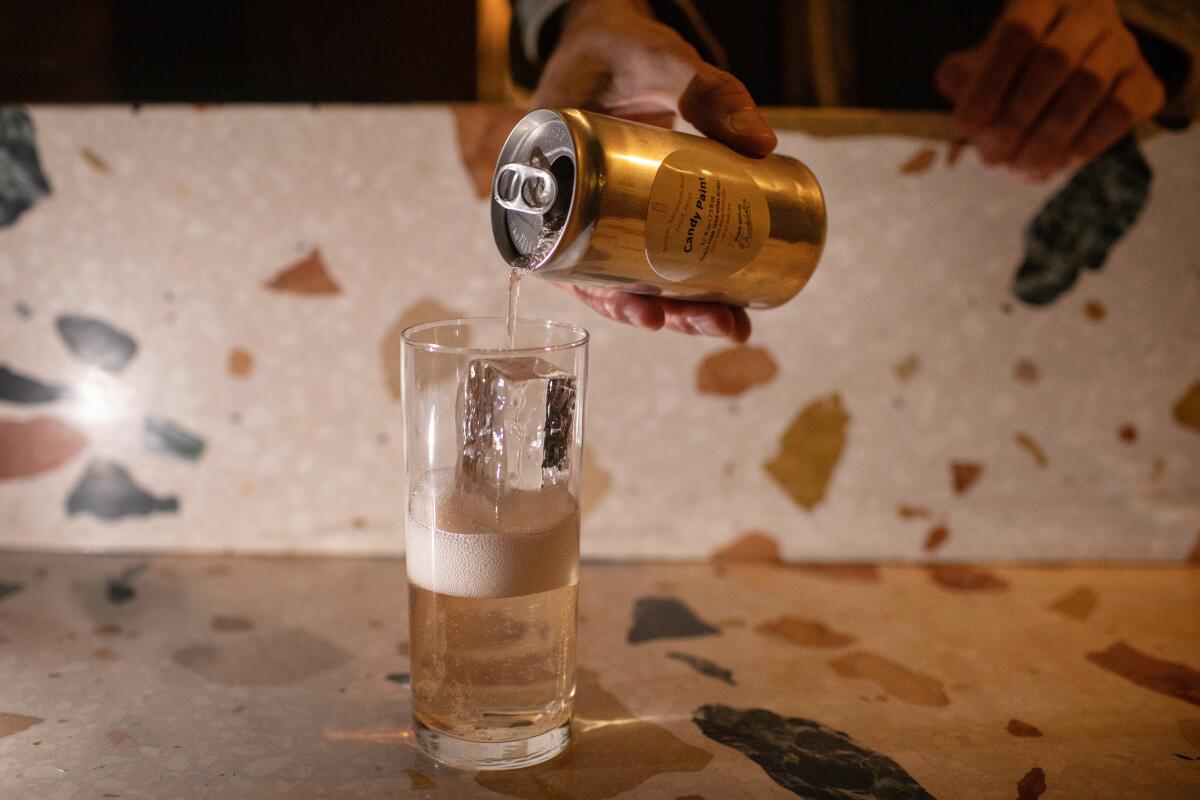
The project led Marwah and Capoferri to collaborate on a cocktail project of their own in L.A., one that would be located next to beloved barbecue joint Park’s Finest along Temple Street (restaurant owners Johneric Concordia and Christine Araquel-Concordia would later join the bar as business partners). The vacant space had previously been home to Dinner House M, a legendary after-hours club and avant-garde hangout that shuttered in 2011.
It seemed like a perfect location, until a snag appeared: City and county officials had revoked Dinner House M’s alcohol license, which meant that its new owners had to start the lengthy application process from scratch.
As the build-out dragged on for months, and then years, Capoferri filled his time with a new position as a brand ambassador for the Campari Group, traveling to as many as 120 bars per month, touting Italian aperitifs and amari at fancy speakeasies and gritty dives. The job enabled him to glean insight from the country’s best bartenders, take notes on prevailing drink trends and generally immerse himself in the latest gadgetry of cocktail-making.
It was this role, he said, that most informed what the Southern-inspired Thunderbolt — named for an obscure julep-esque cocktail invented in a Georgia town of the same name — would become or, more specifically, what it wouldn’t become.
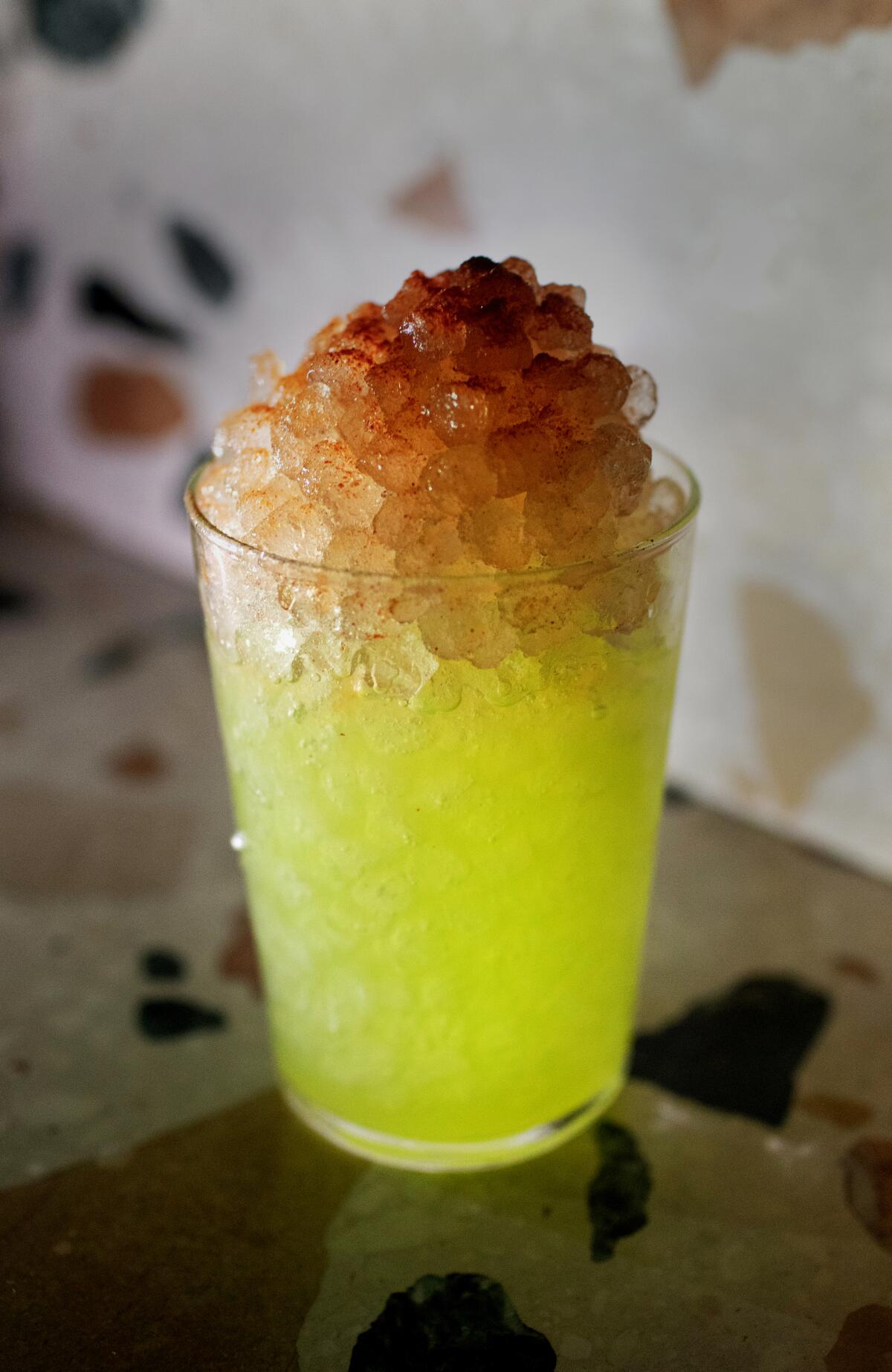
“I didn’t want a place where the drinks cost $20 and took 20 minutes to make,” he said. “We have amazing cocktails, and we’re excited to nerd out about them, but if you want to come in for a cheap beer and a shot of bourbon and talk Dodgers, you’ll be just as comfortable.”
Jamal Arif, a former bartender at the Normandie Club and one of Thunderbolt’s first employees, said he quickly realized the bar, kitted out with a terrazzo counter and a top-line sound system, was doing something special.
“About 75% of our regulars live within walking distance,” he said. “We had this mentality that you had to win the neighborhood first to be a great bar.”
Matt Briskie, 39, and Cristina Briskie-Wood, 38, count themselves as two of those regulars. The Historic Filipinotown couple live around the corner from Thunderbolt and regularly patronized the bar from its earliest days, whether it was for a “$4 michelada” or a “really nice cocktail.”
“It’s such a nice reflection of the area, where you have different cultures and communities intersecting,” Briskie-Wood said. “They were able to fuse it all together on their menu in a way that felt very natural.”
A hallmark of the cocktails at Thunderbolt, which cost between $13 and $14, is the bar’s use of tech and science to increase their quality and consistency. Often this involves “pre-batching,” a methodology where some or all of a drink’s components are prepared beforehand to facilitate ease of service and the integration of flavors.
Despite the popular image of a mustachioed barman chipping blocks of ice by hand or plucking fresh herbs to order, this streamlined approach has become increasingly common at the country’s highest echelon of cocktail bars, as many bartenders look to strip away what Capoferri calls the “pomp and circumstance” of the mixology movement.
Thunderbolt’s Tropipop, for instance — a foam-topped “piña colada in a can” — combines coconut rum, clarified pineapple juice and lactose (milk sugar) before being flash-chilled, carbonated under high pressure and sealed inside a stubby 8-ounce aluminum can.
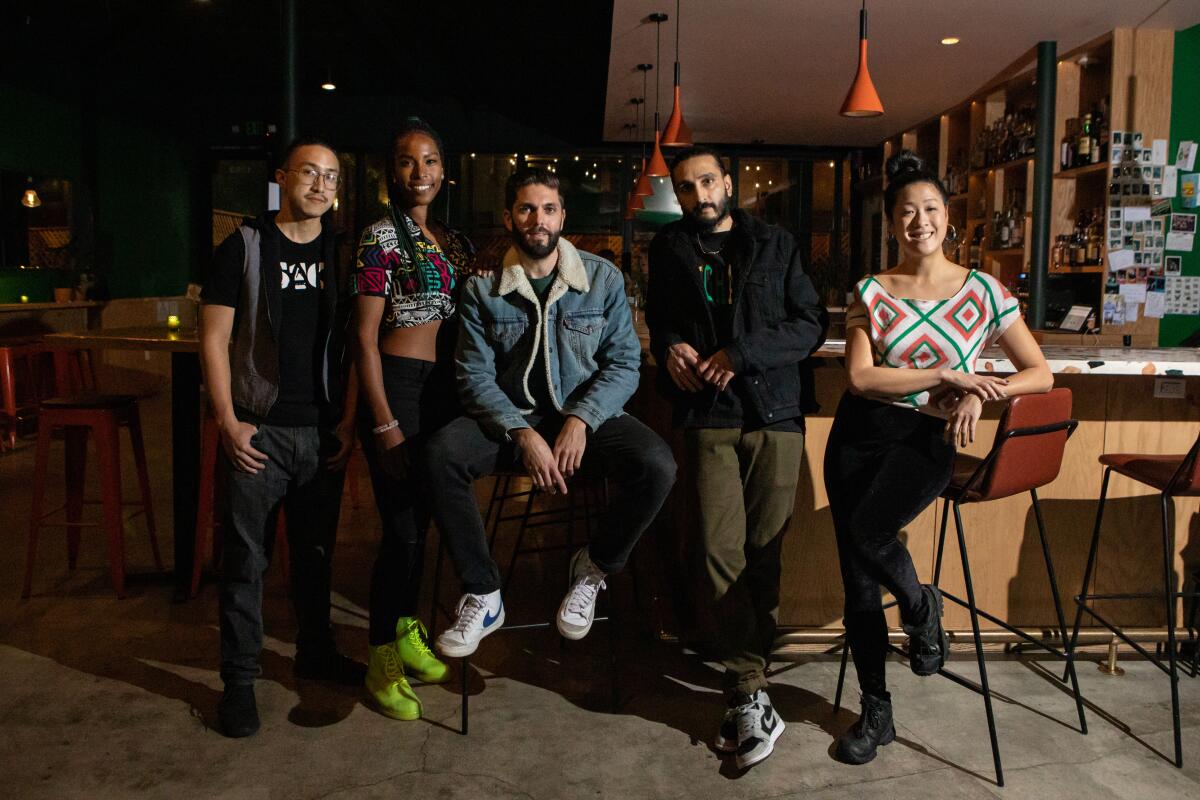
The Liquid Picnic, an aromatic gin cocktail flavored with citrus, tomato, rosemary and black pepper (“reads like a salad, drinks like a Martini,” proclaims the menu) is made using centrifuge-strained tomato water, which replaces the dilution that normally occurs when a martini is stirred with ice. The cocktail mixture is stored in batches just above its freezing point (minus 6 Celsius) and poured to order in a frozen glass with a spritz of lemon oil.
One highlight from the most recent holiday menu was the “I Can’t Believe It’s Not Buttered Rum,” a vegan riff made with a hydrocolloid-emulsified coconut oil syrup and kept warm in a sous vide circulator.
The simple presentation of the cocktails at Thunderbolt often belies their complexity. Capoferri says he detests drinks with garnishes on them (“they’re wasteful”) and avoids preparations that require straining or muddling at the bar counter. The less movement, the better.
“There might be 12 or 14 hours of prep that go into each cocktail, but when you order them, it’s 10 seconds to serve them,” Capoferri said. “All the techniques are behind the scenes.”
Though not every cocktail at Thunderbolt comes in a can, some customers were initially wary when bartenders popped a top and slid them their drink. But Capoferri insists that, when done correctly, the technique produces a cocktail that is more consistent and brighter in flavor than something mixed to order.
“You’re ensuring the drink is preserved at its peak,” he explained. “We’ve opened some that are months old, and they still taste as good as when they were canned.”
The method also gave Thunderbolt a leg up when stay-at-home orders came down in March 2020. Since the bar served food — a compact menu included dishes like country ham with biscuits and fried green tomato sandwiches — it was permitted to sell sealed cocktails to-go, which at that time included a handful of canned spritzes and highballs and a bottled espresso martini carbonated with nitrogen.
“That was a huge break for us because we could pivot into selling cocktails to-go almost immediately,” he said. “We were doing 90% of that stuff already.”
The bar was equipped with an aluminum can seamer, a bottle-capping machine and a vacuum-pouch sealer, which Capoferri used to build an “assembly line” for packaging drinks. One came in a custom three-compartment pouch with pebble ice and a biodegradable straw, so that it could easily be combined and consumed “Capri Sun-style.”
After Thunderbolt closed for the night, Capoferri would often find himself on Zoom calls with other bar owners across the country, guiding them on creating a manageable to-go program and sharing insights on packaging materials and safety regulations.
“It felt like we were all in the trenches together,” he said. “Nobody wanted to be the only cocktail bar left standing.”
Through donations from liquor brands and community supporters, Thunderbolt prepared meals to feed more than 2,500 out-of-work hospitality employees in April 2020. And its “Highball of the Month” program, in which $2 for each drink special sold is donated to a local nonprofit or charitable organization, has now raised close to $30,000 (recent recipients include the Echo Park Trash Club and Black Women for Wellness).
Despite the brisk sales of Thunderbolt’s to-go cocktails, however, the bar remained perilously close to insolvency for much of 2020. Nearly all of the bar staff had been laid off to apply for unemployment, which left only Capoferri running the front of house and two line cooks in the kitchen. At one point, Capoferri worked 124 days without a break. His health suffered. He lost 20 pounds and was diagnosed with celiac disease.
“My mental state went off a cliff. I couldn’t think straight. Things got really dark. I was like, keeping this place alive is really killing me,” he said.
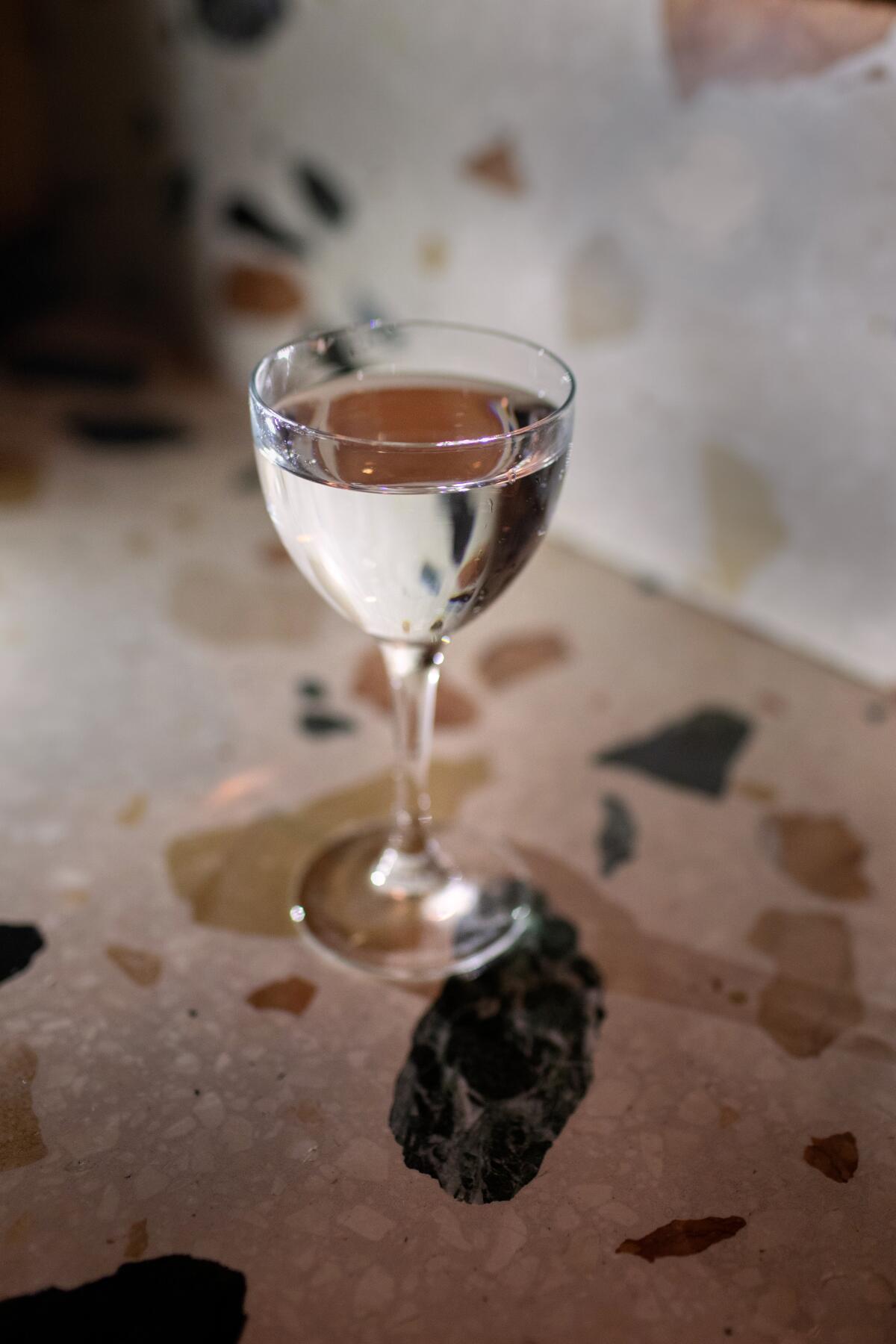
Once outdoor dining was permitted, Thunderbolt began to inch its way back toward stability. Capoferri was able to rehire Camron Robertson, now the bar’s general manager, and eventually rebuild the bar staff, which currently includes an eclectic group of bartending talent, including Karen Fu (Donna Cocktail Club), Tiffany Laster (Liaison Restaurant + Lounge) and Tom Liu (the NoMad).
Like many businesses in the pandemic era, Thunderbolt spent much of 2021 shuttling between various stages of reopening, which made the recognition from the World’s 50 Best Bars that much more surprising.
“We’ve been open twice as long as a COVID bar as we have a regular bar,” Robertson said. “I think we’ve done eight different styles of services since this thing started. So we’re still figuring out what normal looks like.”
Thunderbolt’s to-go cocktail menu is now shorter than it was during the height of the pandemic, but many offerings have become permanent. The bar also recently debuted its first-ever nonalcoholic cocktail list, developed in collaboration with Fence Coffee in West Adams.
Capoferri, who is now able to take a few days off a week and has regained his lost weight, said that the accolades from the World’s 50 Best Bars had created an uptick in business, but he didn’t imagine Thunderbolt’s consciously crafted vibe would change anytime soon.
“We’re this little neighborhood bar that was put together on a shoestring budget and never spent a dollar on PR, so to get that level of attention is a validation of what we’ve been doing,” he said. “But it does sort of light a fire under your ass to be like, OK, what’s next?”
Thunderbolt, 1263 W. Temple St., Echo Park, (213) 372-5099, thunderboltla.com
More to Read
Eat your way across L.A.
Get our weekly Tasting Notes newsletter for reviews, news and more.
You may occasionally receive promotional content from the Los Angeles Times.

